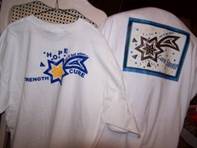Blogging: A Mom’s PerspectivePowerful Patient, 2008 Week 27Joyce Graff, host, on webtalkradio.net Beginning June 30, 2008
Joyce Graff chats with Beverly about her blog, and the role it has played for her in managing her thoughts and emotions through her son's diagnosis and surgeries. We talk about various blogging platforms, and considerations about privacy. About Our Guest
Beverly is a mother of three and a kindergarten teacher. She and her husband Dale have weathered many storms and incidents with their children over the years. When their son Steven began having headaches, then headaches and vomiting, his father took him to the doctor. That began a lengthy journey to a diagnosis of a rare disease, von Hippel-Lindau disease, and embarked all of them on a journey with a lifelong chronic illness.
To keep her friends informed about Steven’s condition without having to repeat it all multiple times (and get upset doing so), she began keeping a blog. Over the years, the blog has taken on a life of its own.
A Few Key Points
It is best to start relatively private. You can always make your site more public if you choose to do so, but start with making it available only to those people you want to inform.
Even if you decide to go public, you should be very careful in disclosing personal details like address, telephone number (which can easily be translated into your address), or last names. In preparing this interview for the web, I deleted all references to her city and state as well.
There is a very good discussion of blogging in Wikipedia
There is also a proposed Code of Conduct for bloggers, not legislation but self-regulation:
Blogging Sites
http://www.caringbridge.org - A CaringBridge website helps keep loved ones informed during difficult times. In return, family and friends give patient and caregiver support through guestbook messages. There is a video on this website to orient you to the service. This service has the best privacy characteristics.
http://www.inspire.com – Inspire hosts online Support Communities for many diseases and conditions, from premature babies to specific diseases. Explore the lists that exist, or apply to start one to focus on your own issue. In addition to the Topics and Discussions in each group, Inspire has a “Journal” area that is a little like a blog in that you can write whatever you are inspired to write, within your support community.
http://vhl.inspire.com - is the support community for von Hippel-Lindau disease in English. The support communities in French, Spanish, German, and Japanese are listed at http://www.vhl.org/support/egroups.php
http://www.blogger.com is a general blogging site for all purposes. There is an orientation on their site. Access Controls let you decide who can read and who can write to your blog. You can use a group blog with multiple authors as a communication tool for small teams, families and other groups. Or as a single author, you can create a private online space for collecting news, links, and ideas, to keep to yourself or share with as many readers as you want.
|
